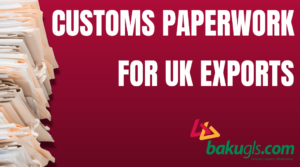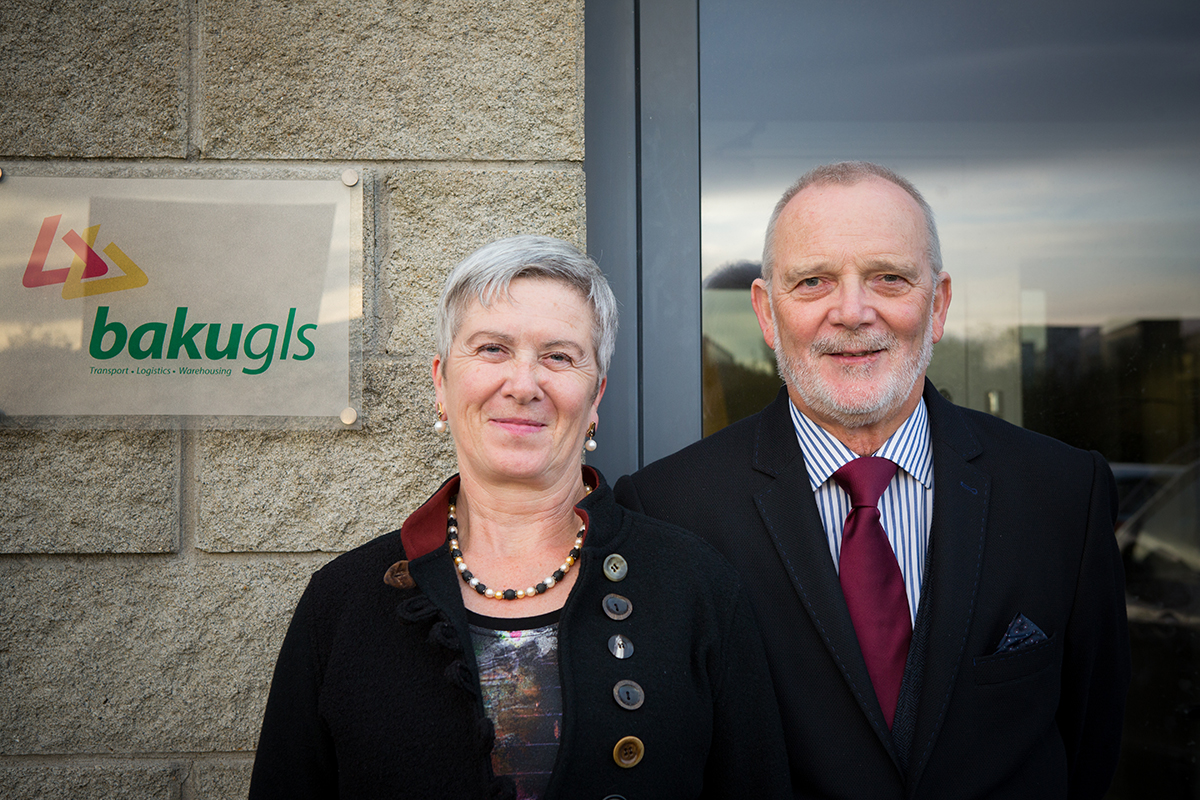
Don’t know the difference between an ENS and an SAD? Not sure why customs are asking you for a CMR consignment note? Don’t worry — we’ve got you covered!
In this guide, we’ll explain the paperwork involved in moving goods from Ireland to the UK. We’ll show you why each document exists, what it needs to include and when you need to submit it.
Commercial Invoice
The first thing you need to export goods from Ireland to the UK is your commercial invoice. The invoice is a vital piece of paper in the customs process. Customs authorities will check your invoice during an inspection. Any errors or omissions can have serious consequences. When exporting from Ireland to the UK, your invoice needs to at least list the following information:
- Seller’s EORI & VAT numbers
- Seller’s name & address
- Buyer’s name & address
- The value & quantity of your goods
- The tariff code (type) of your goods
- The origin of your goods (statement on origin)
- The Incoterms you’re trading under
You shouldn’t need to create a brand-new document here. You will have had to create an invoice for your order whenever you did the deal with your UK-based buyer. Just make sure that all of the information above is included on your existing invoice before the goods get booked onto a truck.
Your commercial invoice needs to match your customs declaration and it needs to be a 100% accurate description of your shipment. It can usually act as the ‘packing list’ for your cargo, but if you’re splitting your shipment into two or more separate bundles, then you’ll need a separate packing list, detailing what’s in each bundle, to accompany your commercial invoice. If you need more information, feel free to call us or read our exporter’s guide to commercial invoices.
Statement on Origin
Origin is now an incredibly important part of moving goods from Ireland to the UK. You can qualify for ‘preferential tariff treatment’ on goods moving into the UK if those goods are of EU origin (and vice versa for UK-to-ROI goods), so it’s very important to record the origin of your goods in your customs paperwork.
There are three main ‘tiers’ of origin declaration that you need to be aware of when exporting to the UK:
- For some goods, you just need to put the words ‘Statement on Origin’, followed by the origin details for your product, on the commercial invoice and/or the customs declaration.
- Other shipments also require a separate document called a supplier’s declaration, which gives the authorities further assurances about the origin of your product. This may or may not tie in with the government’s Registered Exporters System (REX) – it depends on the value of your shipment.
- If you’re exporting the same product for an extended period of time you might also want to apply for Binding Origin Information. Binding Origin Information is a sort of long-term certificate that authenticates the origin(s) of your product.
If you’re new to Origin in customs, we’ve written an exporter’s guide to origin which will give you a good overview. The revenue.ie website lists the full rules on EU-UK preferential origin, if you need more information.
EXS (Exit Summary Declaration)
The EXS is a digital document that you’ll need if you’re moving goods going from Ireland to Great Britain.
The EXS acts as a sort of ‘boarding card’ for your shipment — it’s not the same as a formal customs declaration. EXS declarations explain what you’re exporting, purely from a Safety & Security perspective. They get uploaded to the AEP (Automated Entry Processing) customs system, and the authorities then refer to this information when deciding whether or not to pass your shipment through customs.
The exporter is ultimately responsible for submitting an EXS, but you can get a customs intermediary (like Baku GLS) to handle it on your behalf. If you want to learn more about how the EXS works, there’s a good explanation on the Gov.uk website.
One more thing: EXS declarations are for ‘IE to GB’ exports only. There are different rules for goods moving into UK territory via Northern Ireland (see our guide here).
Sanitary & Phytosanitary Certificates (SPS)
If you’re moving agri goods like livestock, plants or meat from Ireland to the UK, then you’ll have to undergo Sanitary & Phytosanitary (SPS) checks at the border. SPS checks have existed in some shape or form for years — they’re there to control the spread of diseases and contaminants in plants and animals.
SPS inspections don’t just apply to agri goods anymore — they now also apply to any goods travelling on wooden pallets or crates, too. According to Bord Bia, all Wood Packaging Material (WPM) moving between Ireland and the UK must meet the ISPM 15 standard for treatment and must carry ISPM 15 compliant marking.
The SPS certification process involves a lot of different computer systems and documents. Goods need to be registered on both the EU’s TRACES system and the UK’s IPAFFS systems. You may also need a document called an Export Health Certificate (EHC) and/or a Common Health Entry Document (CHED), depending on what you’re exporting. This is a complex area, and a lot of the computer systems and paperwork requirements have changed recently, so if you have any questions please feel free to contact us.
Single Administrative Document (SAD)
The SAD, or Single Administrative Document, is your actual ‘customs declaration’. Any goods leaving EU territory (in this case, entering the UK) need to have an SAD.
SADs contain a lot of the same information that a commercial invoice contains, but they do so in a structured way that ties in seamlessly with global customs systems. Unlike your Commercial Invoice, which is normally something you create yourself as the exporter, the SAD is usually created and submitted on your behalf by a customs intermediary (Baku GLS for instance). If you want to see one of these forms yourself, you can download a blank template SAD from the gov.uk website.
The SAD is your formal legal declaration to the customs authorities. It should be accurate, thorough and clearly itemised, with no omissions or estimates. Every little detail — from the relevant HS codes right down to the precise weight of your goods — needs to be recorded accurately.
Bill of Lading
The bill of lading is the waybill that covers transport of goods by sea. There are different waybills for air freight and goods moved by rail.
Bills of lading were historically used to record whether goods had crossed the ocean in good condition. If goods were damaged in transit at sea, the buyers of those goods could refuse to accept the consignment based on whether the bill of lading was ‘clean’ (goods undamaged) or ‘unclean’ (goods damaged). Nowadays, the bill of lading has become just another piece of mandatory customs paperwork.
Customs authorities will want to see a bill of lading for any goods you export. The bill of lading may be inspected at the precise moment when goods are clearing customs or it may be checked years later as part of a customs audit. It’s ‘paper proof’ of what goods actually arrived at their destination, when they arrived and what condition they arrived in.
If your goods are crossing borders on a multimodal basis (travelling by sea and rail and air, for instance), then a Combined Transport Document might be used instead of a bill of lading. If you’re shipping dangerous goods, there are specialist waybills for this kind of product.
CMR Consignment Note
Whenever you sell goods business-to-business, the deal is usually subject to your organisation’s Terms and Conditions. These T&Cs might work perfectly for both you and the buyer, but they might not be acceptable to the various border authorities whose jurisdiction your goods will pass through on its international journey.
If goods are crossing international borders by road, they usually need to comply with a globally-recognised standard set of terms called CMR. The CMR consignment note is basically a document that travels with your cargo to ‘prove’ that you and your buyer consent to these standard terms while your goods are in transit. CMR consignment notes need to give specific details about the buyer, the seller, the items being transported and any customs duties payable on those items. If you’re transporting dangerous or controlled goods, your CMR consignment note needs to state this, too.
Because the CMR consignment note is only needed on goods that travel by road, you might not need one — it depends on your chosen route into the UK. Our guide to customs from & to Northern Ireland gives an overview of the basic requirements.
Pre-Boarding Notification (PBN)
When a trailer arrives at an Irish port, it can’t board a ferry to the UK unless it has a PBN, or Pre-Boarding Notification, number. The Pre-Boarding Notification isn’t a standalone document — it’s more like a folder that holds the customs declarations, SPS certificates and other customs paperwork of any goods contained in that trailer.
The PBN reference system only applies to goods moving on Ro-Ro transport (Ro-Ro is short for Roll-On, Roll-Off transport: the kind of ‘truck and trailer’ service we offer here at Baku GLS). It’s the job of your haulier to handle Pre-Boarding Notifications, so technically you shouldn’t have to concern yourself with PBNs if you’re the exporter. You just need to remember that your goods can’t board a ferry if the trailer doesn’t have a PBN number, and your trailer won’t have a valid PBN number until all of your customs paperwork is in order.
The revenue.ie website has more information about PBNs on Irish exports.
In Summary…
We hope this has given you a good overview of the main documents you might be asked for when exporting to the UK. This isn’t a comprehensive list of every document you could ever possibly need. There are many more licences, insurance declarations, relief certificates and other bits of paper that apply to specific types of cargo crossing the Irish Sea. If you want to know more, you can find a good guide to export procedures on the revenue.ie website.
If you are in any doubt about the paperwork you’ll need to submit when exporting to the UK, our advice is to get advice from a customs intermediary. Customs advice doesn’t cost a fortune, and it protects against accidental non-compliance with any obscure relevant national or international customs laws. If you would like us to provide a quote for our own customs support service, give us a call on +353 53 9161786. We’ll be happy to talk you through everything.














